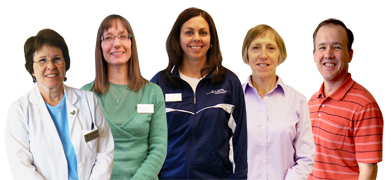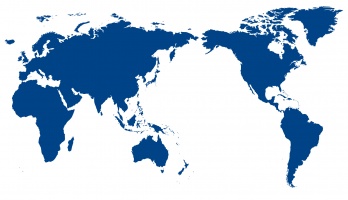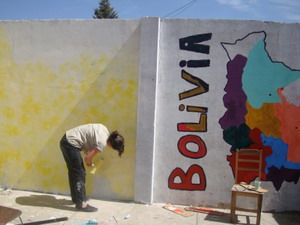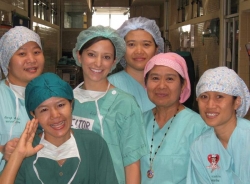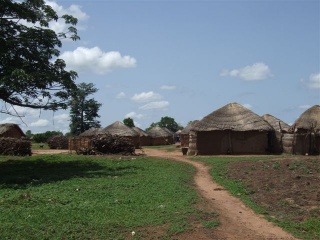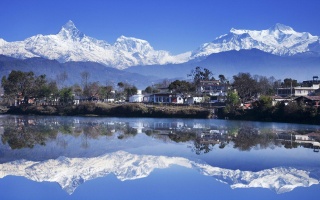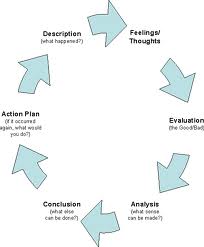Volunteering - Keep this in sight…the future is bright
Original Editor - Mark Mitchell, David Murphy, Palmer Patterson, Brianna Reed, Michael Walsh as part of the QMU Current and Emerging Roles in Physiotherapy Practice Project
Top Contributors - Palmer Patterson, Mark Mitchell, David Murphy, Brianna Reed, Michael Walsh, Kim Jackson, Admin, 127.0.0.1, Tony Lowe, WikiSysop and Rucha Gadgil
Introduction[edit | edit source]
This page is primarily intended to be a resource providing information on volunteering opportunities available both within the UK and abroad. The opportunities highlighted consist of both physiotherapy specific settings, as well as opportunities in areas where transferable skills can be gained or utilised that are out with the typical physiotherapy practice areas. The information provided on this page is intended to be utilised by students, both current and prospective, as well as qualified practitioners, looking to enhance knowledge, clinical skills and life experiences.
Volunteering is a vital aspect of everyday life. Without it, people would be homeless, starving and in dyer need of emergency health care.
Learning Outcomes
[edit | edit source]
- Define and explain the benefits of the Third Sector.
- Discuss personal and professional motives for perusing volunteering opportunities.
- Propose reflective strategies to enchance your volunteering experience.
- Apply acquired knowledge to formulate a volunteering strategy.
- Idenifty precautions and risks associated with volunteering in various settings.
Scotland's Third Sector [edit | edit source]
Organisations can be divided into private, public, for profit and non-profit. Those organisations which are established as non-profit, and which are not part of the public sector, are referred to as being part of the Third Sector [1]
Facts: [1]
- 45,000 voluntary organisations in Scotland
- Employs 137,000 people
- In 2010 the sector generated £4.4 billion for the Scottish economy
- In 2009 the sector were custodians of £9.2 billion worth of assets
- Public sector contracts and grants make up around 42% of the sector’s income, although three-in-five organisations receive no income from the public sector
Some of the current contributions to health care in Scotland involve:
- Addressing health inequalities – regeneration of work and community development
- Health behavioural interventions for drug abuse, mental health, healthy eating campaigns, physical activity initiatives and family support organisations
- Community based care and support – the Third Sector is the largest sector providing this community based care
- Funding for research - for example breast cancer and Multiple Sclerosis
Historically, the Third Sector played a large role in health care up until the state took over and formed the NHS in 1948. With advances in healthcare and longer life expectancies, the NHS budget is increasingly strained. Therefore, the government is looking for options of relieving this strain and is turning towards the Third Sector. It has been shown voluntary groups are capable of competing with private and public sectors which will essentially free up NHS staff and deliver better care in the public communities. [2]
Introduction to Volunteering [edit | edit source]
“Our vision is of a society in which social action and reciprocity are the norm and where volunteering is encouraged, promoted and supported because it has the power to enhance quality, reduce inequality or improve outcomes in health, public health and social care”.[3]
What is it that we mean by volunteering?
Volunteering may be defined as "freely offering to take part in an enterprise or undertake a task; an unpaid activity conducted for the benefit of others, out-with family members".[4]
How do volunteers help?
- Improve patient experience within hospitals and other medical centres
- Building a closer relationship between services and communities
- Tackling health inequalities and promoting health in hard to reach groups
- Supporting integrated care for people with multiple needs
How many people volunteer?
The National Citizenship Survey provided an overall level of formal volunteering in England.[5] Approximately 3 million regular volunteers support the health sector as a whole with around 1.9 million working with the elderly. The 3 million volunteers across health and social care, is double that of NHS paid workforce in England.
Areas of volunteering in health and social care:
- Community Settings – social support, teaching and training, well-being activities in the community, coaching patients through lifestyle changes, fundraising.
- Acute Hospital Care – assisting with meal times, collecting patient feedback, clerical support
- Mental Health Care – Peer support, friendly schemes, sports groups
- Palliative Care – Bereavement counselling, emotional support for families, training others wishing to volunteer
- Home Care – Home visits to reduce feelings of isolation
- Care Homes – Activities to enhance well-being and provide entertainment
How can we incorporate Physiotherapy with volunteering?
As a physiotherapist, you are in high demand, especially in countries with a poor economic climate and health system. There are many charities and organisations that allow both qualified and student physiotherapists to partake in such life changing experiences.
Why should you volunteer?[edit | edit source]
Benefits of voluntary work:
- Builds character, fosters interpersonal trust, toleration and empathy for others. [6]
- Volunteering can be regarded a form of social integration, which has long been suggested to improve personal well-being and may yield mental health benefits.[6]
- Gain confidence, self-esteem, motivation and a sense of achievement.[6]
- For those who are unemployed and seeking work, it can be a stepping stone to paid employment.[6]
- For those currently in a position of employment, it can advance a person’s chance of moving forward and developing a career, it is a form of continuous professional development.[6] [7]
- As students: gain knowledge, the ability to problem solve, confidence, communication skills and independence. [8]
Why volunteer in Physiotherapy?
Voluntary work is an excellent means through which both prospective and current physiotherapy students may enhance their abilities and understanding pertaining to the practice of physiotherapy. Voluntary experience may also assist the prospective student in achieving the physiotherapy entry requirements.
Benefits for recipients:
- Education for patients and families.[7]
- Sharing essential skills and knowledge with members of the community can be beneficial long after the volunteering experience is over.[7]
- Quality of life improvement. [7]
- Improved patient satisfaction.[9]
- Developing your CV
- Gaining hands on experience
Interview with two NHS Physiotherapists which further descibes the beneficial aspects of Volunteer work when applying for jobs:
*(note: Both physiotherapists have conducted a notable share of interviews throughout their careers to date)
“In the current climate, the demand for jobs, when they eventually get to advert, is pretty high. For this reason anything that can help a candidate sell themselves and demonstrate qualities which would be helpful in the work environment is extremely important. When we look at CV's and application forms the decision to accept and application for interview is based on a scoring system which is based on the job spec. The job spec is available for applicants at the time of advert and this is what all good applications should be based around. A job spec (or sometimes known as person spec) is a detailed account of the qualities required for the position (e.g. good communication, organisation skills, team working etc.). Especially when students are graduating and looking to get their first job it is unlikely that they will fulfill all aspects of the job spec from their clinical/placement experience alone and so demonstration of these qualities can only be deemed from other sources like other employment or voluntary work. The clever candidate who can tease the important aspects of a non-physio work experience (volunteer or other) and communicate how these skills would enhance their clinical working skills and relate to the job spec, will be the most likely to be the one who gets an interview in the first instance. If they continue to go on and build on this in the interview they will stand a good chance of success. A common mistake that candidates often make is to mention these experiences but not highlight the relevant aspects of that experience or alternatively give too much information and rely too heavily on this detail in the application form. Its a matter of being concise and relating the experience to the requirements on the person spec. When it comes to interviews it is a similar scenario”. (Susan, PT, Band 7)
1-When looking though resumes of possible job candidates, does volunteer experience obtained by candidates often stand out to you? Do you note any difference in value between it and other paid work experiences?
- “Volunteer experience would stand out in a related field to the post being applied for. There is no difference in value as it about the experience gained. We use criteria to shortlist for interview so everything is driven by the criteria – this is for equality purposes.” (Clair, PT, Band 7)
- “Yes, other experience is important in the application of band 5 positions. I don't think there is a difference between paid or not, as the key lies in what that experience has given you, skills wise, to enhance your job performance.” (Susan, PT, Band 7)
2-Do you think any differently of candidates of whom have had much volunteering experience vs. those with none? If so what might these differences be?
- "Experience is experience, paid or unpaid. It is about the relevance of the volunteering or paid experience to the post and also the transfer of the skills gained when volunteering/working to the role on offer. Again we have to look at how the application compares to the criteria that we have this is called the person specification.” (Clair, PT, Band 7)
- "It definitely looks good if candidates have tried to get direct healthcare type experience from voluntary work. It shows an interest and a proactive approach to learning.” (Susan, PT, Band 7)
3-If a job candidate had much volunteer experience that was not directly related to physiotherapy, but the candidate could relate many qualities learnt through this experience to the physiotherapy practice (say organization, and communication skills for example); How highly would you regard these experiences? Would you consider these experiences as being beneficial assets to a candidates resume?
- “They are beneficial qualities but it has to be clearly communicated as to how they are relevant to the post being applied for. The skill is in getting your experiences (paid or unpaid) across in the application form or resume.” (Clair, PT, Band 7)
- “Its all about communicating the important aspects of any experience (healthcare based or not) and how these skills can be transferable to the job applied for.” (Susan, PT, Band 7)
Volunteering in Physiotherapy [edit | edit source]
As a result of increasing numbers of requests from countries who do not have adequate physiotherapy support, physiotherapists are in high demand by volunteer recruitment agencies in third world countries for developing projects.[10] Volunteers in these economically unstable countries can help train local staff and develop health services. In such countries, it is not only qualified physiotherapists that are sought after, students are also valuable volunteers.
Health care students are continually encouraged to reflect on learning experiences[11]; volunteering abroad may help to develop skills in critical reflection from learning opportunities and ethical dilemmas encountered. [11]
Volunteering in a developing country, whether it be for a few weeks, months or years, has many positive impacts. People have the opportunity to broaden their outlook and acquire a sense of personal identity, skills, confidence and knowledge. Volunteering in underdeveloped countries can also encourage individuals to become an active volunteer in their own community.[11]
The World Health Organisation[12] states there are approximately 52 million individuals suffering from a form of disability residing in developing countries, indicating a large demand for physiotherapy in these nations.[7]
In developing countries, volunteers will commonly encounter poorly resourced clinics and hospitals with high patient loads and underpaid staff[13]. The lack of experience, resources and funds for treatment of these patients leads to advanced conditions that are rarely seen in the developed world [14][15][13][16][17].
Practicing in wards which are poorly resourced can necessitate physiotherapist to resort to the basics of their training; i.e. practicing the diagnosis and treatment of conditions without the use of familiar physiotherapy equipment. These placements thus provide an excellent opportunity to the physiotherapy student and professional alike, to hone core skills through the differing challenges and contexts that such environments provide.
Participants of physiotherapy placement programmes claim the experiences to be rewarding [14][13]. These placements enable students and professionals to actively help disabled children and adults lead lives that are as normal and pain-free as possible. The need for rehabilitation is vitally important and, whether or not you have experience, working as a physiotherapist, or looking to gain experience working alongside physiotherapists, your presence can be invaluable to the lives of many. Whether you are volunteering in polio or leprosy clinics in India, a centre for disabled children in Nepal, physiotherapy departments of large hospitals in Ghana or a burns unit in Bolivia, you will learn a great deal about the practice of physiotherapy; enhancing your own skills and the lives of others simultaneously [14].
Volunteering in the UK [edit | edit source]
Volunteering Opportunities in Physiotherapy [edit | edit source]
StreetSmart Physio [edit | edit source]
Info: A group of qualified physiotherapists who provide a volunteer service to homeless people in Edinburgh. StreetSmart Physio are always keen to recruit new graduates looking for clinical experience. StreetSmart Physio has helped a number of newly qualified physiotherapists gain full-time or part-time employment due to the experiences gained while volunteering with the charity. StreetSmart Physio also arrange study days when clinicians get together to share and up-date their knowledge and skills in common clinical problem areas.
Requirements: To volunteer with StreetSmart Physio you must be a UK registered physiotherapist andhave HCPC registration.
How to: For further information email [email protected] or alternativelyclick here for more information
Volunteer Scotland (VS):[edit | edit source]
Info: VS provide volunteers with the ability to search an up-to-date database of current volunteering opportunities throughout Scotland. VS’s aims include increasing the number and diversity of volunteers in Scotland and look to achieve this by understanding volunteers' needs, improving access to volunteering opportunities and delivering opportunites through a robust, evidence based approach.
Requirements: Anyone can access the VS resource but certain roles may require specific qualifications, checks or training.
How to: Click Here to visit their website.
Sport Scotland:[edit | edit source]
Info: Sport Scotland provides opportunities for individuals to either get involved in or stay involved in sports. Volunteers are needed to undertake challenging roles such as coaching and sport administration. Associated with ‘Volunteer Scotland’
Requirements: Certain sport specific certifications or training are sometimes required for coaching, as well as an PVG check.
How to: Check out and select opportunities of interest found on the webpage.
Project Scotland: [edit | edit source]
Info: offers 18 to 30 year-olds the chance to make a positive contribution to their community and their country through volunteering. Project Scotland works with 300 Scottish charities and organizes 1000 plus volunteering opportunities yearly.
Requirements: Must be age 18-30. For specific requirements and training refer to the charities you wish to volunteer with.
How to: Complete an online application form specifying your interests and skill and be matched with an appropriate organisation.
Crisis at Christmas:[edit | edit source]
Info: Volunteers at Crisis are needed to help the homeless during Christmas. Many roles are available such as providing on-going one-to-one support for our homeless clients, to raising much needed funds, to being a trustee on our Board, to operating the Crisis centres over Christmas.
Requirements: You do not need any qualifications or experience to be a general volunteer, however Some service volunteers and activities volunteers are required to have specialist skills, qualifications and appropriate insurance before they can apply and, if so, volunteers must provide proof of these. Must 18 years of age, or 16/17 with accompaniment of a person 25 or older.
How to: Complete the online application, and review the essential information. For further details contact [email protected]
Out-with Physiotherapy[edit | edit source]
As a physiotherapist, there are also transferrable skills, relevant to practice, that can be gained from volunteering out-with a physiotherapy environment. The following are a number of opportunities and resources you may utilise to begin this process.
[edit | edit source]
NHS Lothian[edit | edit source]
Info: Volunteers can be involved in a number of different roles, including: information giving, health promotion, helping at clinics and events, fundraising, library, café and shop staffing, ward visitors, ward helpers, transport, chaplaincy, administrative support, research projects and therapeutic care.
Requirements: Volunteering opportunities within NHS Lothian are available for both young and old, qualified and non-qualified.
How to: NHS Lothian can provide a list of contacts to discuss relevant volunteering opportunities. http://www.nhslothian.scot.nhs.uk/WorkingWithUs/GetInvolved/Volunteering/Pages/default.aspx
Third Sector Internship Scotland (TSIS)[edit | edit source]
Info:TSIS is a programme run for students and graduates in Scotland to gain working experience within the third sector. It aims to bridge the gap from university life to the working environment as well as further progress their techniques and abilities. The programme is a collaborative project between third level education and the third sector and is run by Queen Margaret University, the Open University Scotland and the Scottish council for Voluntary Organisations.
The five core areas of the TSIS include:
- Internship development
- Recognising achievement and promoting reflective practice
- Employer engagement and support
- Developing resources and relationships for sustainability
- Learning, evaluation and dissemination
Requirements: Internships are available to all third level students, both at undergraduate and postgraduate levels.
How to: All internships run by the TSIS are offered to students who come through a vigorous and competitive recruitment process. Up to date job opportunities can be found on the TSIS website and details of the individual application processes/contact details: http://www.3rdsectorintern.com/about/
Chest Heart & Stroke Scotland (CHSS)[edit | edit source]
Info: CHSS improves the quality of life for people in Scotland affected by chest, heart and stroke illness, through medical research, influencing public policy, advice and information and support in the community. CHSS state that volunteers are a vital part of the organisation and without their dedicated support none of their work would be possible.
Requirements: CHSS volunteering opportunities are available for both young and old, qualified and non-qualified. For some volunteering roles it may be beneficial to have experience in health or social care.
How to: The CHSS website provide the relevant information for potential volunteers.
Volunteer Centre[edit | edit source]
Info: The Volunteer Centre agencies strive to provide a database for all volunteering opportunities in each area of Scotland. The widespread databases include:
- Volunteer centre east Lothian
- Volunteer centre Mid Lothian
- Volunteer centre gateway west Lothian
- Volunteer centre Fife
- Volunteer centre borders
- Volunteer centre Scotland
These centres of information provide free assistance, support and direction to where and how you can get involved in volunteering, as well as how volunteering could lead you to paid work. Further to this, opportunities to develop skills and knowledge can also be gained through the many training sessions available on the volunteer centre webpages. Emphasising the achievements and commitment of their volunteers is a predominant feature of the Volunteering Centre as they strive to provide recognition of their volunteers by holding an annual awards ceremony termed the Saltire awardshttps://saltireawards.org.uk/. These are applicable to young adults aged 12 to 25 and provides the opportunity to earn incentives and prizes.
Requirements: The volunteer centres are for both young and old, ranging from young adults between the years of 12 years into the older adults. Individual organisation requirements are dependent on the current opportunities available and your particular area of interest.
How to: Up to date job opportunities can be found on the specific volunteer centre databases and details of the individual application processes / contact details etc.
Do-It [edit | edit source]
Info: A resource providing current opportunities across the UK pertaining to your specific area of interest. They provide volunteering opportunities for professionals, students as well as the general public.
Requirements: Open to volunteers of all ages. Individual organisation requirements are dependent on the current opportunities available and your particular area of interest.
How to: For more information, visit Do-it.org.uk.
Volunteering England [edit | edit source]
Info: An online resource committed to supporting, enabling and celebrating volunteering. Linking policy, research, innovation, good practice and programme management with the involvement of volunteers is a top priority.
Requirements: Open to volunteers of all ages. Individual organisation requirements are dependent on the current opportunities available and your particular area of interest.
How to: For more information, please visit http://www.volunteering.org.uk
Community Service Volunteers (CSV)[edit | edit source]
Info: CSV provides volunteering opportunities ranging in age from students through to retirement. Offering a wide range of areas in which you may utilise your professional skills, enhance your knowledge in a new setting, and further develop your CV.
Requirements: Open to volunteers of all ages. Individual organisation requirements are dependent on the current opportunities available and your particular area of interest.
How to: You can get in touch by calling: 02076431427 For more information visit http://www.csv.org.uk/volunteering/full-time/why-volunteer
Volunteering Abroad[edit | edit source]
Countries[edit | edit source]
Austrailia[edit | edit source]
Australia is a country comprising the mainland of the Australian continent, the island of Tasmania, as well as surrounding smaller islands [18]. It is a well developed country, ranking highly in international comparisons of national performance, such as quality of life, health, education, and economic freedom [19]. It is a multicultural country, providing a unique experience and opportunity to explore diverse cultures, foods, lifestyles and customs [20], it also has a variety of unique wildlife exclusive to the Australian continent [21].
What opportunities exist?
There are endless volunteering opportunities available across Australia, from animal welfare to teaching English, whichever you choose depends entirely on what you are looking to achieve from your experience. There are many organisations and resources at your disposal. There is something for everyone no matter what your interests are!
A free online resource and service providing an extensive list of volunteering organisations and opportunities across Australia. They strive to improve efficiency of recruitment of volunteers for non-profit organisations and seek to provide you with an optimal experience to suit your needs.
A free online service providing students and professionals the opportunity to participate in various areas such as events, environmental conservation and during an emergency or crisis. Volunteers are encouraged to create their own online profile to help keep record of volunteering experience, as well as to keep track of opportunities and organisations which fit their interests. You may also send your volunteer profile on to organisations when you wish to apply for a job or other voluntary experience.
An online resource providing useful and important information when it comes to volunteering. They provide access to volunteer resource centres throughout each state and territory in Australia.
Real Gap Experience
Offers various opportunities including adventure tours and volunteering at koala sanctuaries.
Travellers Worldwide
This resource provides a variety of volunteering opportunities from wildlife conservation to teaching sports.
Requirements:
You may require a tourism visa to gain entry to the country. Under your tourist visa you may be able to work as a volunteer if:
- Your main purpose in visiting Australia is tourism, and any voluntary work remains incidental to this
- The work involved would not otherwise be undertaken, in return for wages, by an Australian resident
- The work is genuinely voluntary and that no remuneration is received in return for the activities
Note: It is acceptable, under the conditions of the Tourist visa, to receive meals, accommodation and/or reimbursement of out-of-pocket living expenses in return for voluntary work [22].
Australian Government information on visas:
Depending on the volunteering opportunity you choose, you may be required to pay for expenses. Many volunteering sites will provide you with accommodation and meals while you are with them, however, they do not often cover travel expenses.
Specific immunisations are not required to travel to Australia, however, you are encouraged to have your routine vaccines up to date. For more information, visit the NHS travel information page.
A note of caution:
If you are entering Australia within six days of having stayed in a yellow fever-infected country, you will need proof of yellow fever vaccination. Visit WHO, or Centers for Disease Control & Prevention.
Bolivia[edit | edit source]
Bolivia, officially known as “the Plurinational State of Bolivia”, is situated in central South America and is completely bordered by other countries, therefore being termed “landlocked”. The countries that border Bolivia are, working clockwise from the northeast, Brazil, Paraguay, Argentina, Chile and Peru.[23]
Prior to European colonisation, the mountainous Andean area of Bolivia was included in the Inca Empire. Conquistadors took control of the Bolivian region in the 16th century and entered Spanish colonial rule. On August the 6th 1825 Bolivia established itself as a republic after 16 years of revolutionary war. The country is named after the legendary revolutionary leader Simón Bolívar. [23]
Bolivia is a democratic republic that is divided into nine departments and is classed as a “developing country”, with a poverty level of 53%. The population is estimated to be 10 million, constituted by many ethnicities. Spanish is the main language medium, although there are 37 other languages, many of them indigenous, which are classed as official. [23]
Opportunites
- Volunteer at various centres across Bolivia for children with special needs, help children through a variety of sessions including physiotherapy and hydrotherapy
- Volunteer at the burns unit of a local hospital, physiotherapists are involved in social integration, functional rehabilitation, and sensorial recovery of the patients, age ranging from new-borns to children of fifteen years of age
- Volunteer at local orphanages with children requiring physiotherapy, working on a one-to-one basis with each child providing them with valuable physiotherapy support and also concentrated attention which will enable them to thrive[24]
Requirements
Physiotherapists volunteering on projects in Bolivia are required to be aged 18 or older. An intermediate level of Spanish is required in order to communicate directly with the majority of local staff and patients. Volunteers who lack confidence in their Spanish language ability are encouraged to take a Spanish Language course or to join a teaching or care project. This gives the volunteer an opportunity to improve their language skills before starting a physiotherapy specific project. [24]
How To
Projects Abroad offer volunteering programmes in physiotherapy in Bolivia with costs ranging from £1,495 (4 weeks) to £2,695 (12 weeks) with as many additional weeks as the volunteer desires costing £150.[24]
Citizens of most South American and Western European countries may attain a tourist card on entry for stays of up to 90 days, depending on their nationality. However, this is subject to change; the citizen’s relevant consulate should be consulted prior to entry. If a longer stay is required an extension to a tourist card is necessary and is easily accomplished at the immigration office in any major city. The maximum time travellers are permitted to stay in the country is 180 days in one year. Alternatively, you may apply for a visa. Visas are issued by Bolivian consular representatives, including those in neighbouring South American countries. Costs vary according to the consulate and the nationality of the applicant. [25][26]
Living arrangements during a Projects Abroad programme in Bolivia involves living with one of the programme’s host families and therefore allows the volunteer to have an authentic Bolivian living experience. There are many other volunteers to meet and opportunities to explore the surrounding countryside. Projects Abroad have an office run by an experienced “Country Director” in Bolivia. Staff at the office can be contacted 24 hours a day and are responsible for volunteers general well-being and liaise with UK staff. [24]. Projects Abroad provide a comprehensive travel and medical insurance automatically; volunteers are covered no matter where you are from or where you are going. This policy can be extended on request to cover other travel you may be doing. It is important that the policy is carefully read, especially regarding pre-existing medical conditions, to check that the cover meets your needs. [24]
Social conflict is common in Bolivia and blockades may occur along the main roads. Public transport can be disrupted at very short notice and strikes may result in widespread road blockades, including on roads to and from airports. It is advised to never try to cross a blockade. There is a risk of ‘express kidnappings’. It is advised that care is taken when travelling around Bolivia, particularly on arrival. Use a registered taxi company. [25]
It is advised to carry a photocopy of your passport, including the personal details, entry stamp and disembarkation card with you at all times in case it is requested by immigration officials or the police. Parts of Bolivia, including La Paz are at high altitude which can cause altitude sickness. [26]
Testimonials
"From my experiences I learnt how to treat patients with burns, make and fit splints, do exercises for burns, hydrotherapy, work with children, and the use and fitting of pressure suits. It was such a great experience and if this is your placement I have no doubt that you will love it too. I will truly miss working there, all the great people I met and of course all those children!"
Siobhan Ni Cheidigh
Physiotherapy in Bolivia [27]
Volunteering opportunities out-with physiotherapy
There are a number of options to volunteer in Bolivia out-with the scope of physiotherapy. Government sponsored organisations, or non-governmental organisations (NGOs) such as the Peace Corps, offer longer term programs (usually lasting two years) for which volunteers receive an allowance, departure briefings and ongoing organisational support. There are also church affiliated or religious organisations which offer short-term opportunities, often on a group basis. Smaller volunteer organisations (often profit-based) offer independent travellers the opportunity to work in community projects; these usually have a two or four week minimum for which you pay and cover a language immersion course, a local home stay and administrative costs. Some popular volunteer options in Bolivia include:
- Animales S.O.S is an animal welfare group caring for mistreated or abused stray animals [28]
- Parque Machía is a volunteer-run wild animal refuge; minimum commitment is 15 days and no previous experience working with animals is required [29]
- Volunteer Bolivia arranges short and long term volunteer work, study and home stay programs throughout Bolivia [30]
Thailand
[edit | edit source]
Thailand is a large country located in the Indochina peninsula in the southeast of Asia. It has a population of around 64 million people with a significant amount of the population living in rural isolated parts of the country. Thailand is a country known as the land of smiles. Along with modern capital city of Bangkok and its friendly people Thailand has many beautiful attractions such as the many Buddhist temples, exotic wildlife and spectacular islands. The country is steeped in history with very unique traditions and cultures. There over 100 national parks in Thailand, providing excellent opportunities for trekking, biking, camping and photography. There are also many beautiful beaches which can provide opportunities to experience some of the fantastic marine wildlife on offer. Although very beautiful with a well-established health system, Thailand significantly benefits from the additional assistance of volunteer programmes within the country; additional help is necessary to help increase medical accessibility. Although the Thai government deliver medical care for all citizens, there are still a number of groups that do not receive the full healthcare they require. Many people living in rural Thailand suffer from illnesses and health conditions that could be easily prevented and addressed by early detection.
Click here for a tourism video of Thailand.
Opportunities out-with physiotherapy:
Organisations:
Cross Cultural Solution (CCS)
Info: The CCS is the safest volunteering organisation abroad with continually reviewed comprehensive safety and security strategies. The CCS has over 18 years’ experience with over 30,000 past volunteers Provides volunteers with the opportunity to give support and care to infants and children, improve general health among the ageing and isolated populations, and provide education and quality of care for people with disabilities. Opportunities range from assisting with the everyday workload of the healthcare professionals to supporting and educating people in overcrowded and poorly serviced areas of Bangkok.
There are a variety of different types of programmes on offer:
• The high school volunteer abroad programme for young adults aged 15 -17 - Group volunteering trips, whereby for every eight volunteers one goes free
• International internships, providing opportunities for international students to get involved with volunteering
• Family volunteering trips
• Gap year opportunities with expert programme specialists ensuring the right programme for you and
• Continuing medical education (CME) for qualified medical professionals looking to continue education or earn CME credits
Requirements:
The CCS provides volunteering opportunities for young and old, qualified and unqualified. The type of programme you desire will determine the specific requirements needed. You can access the specific requirements via the link below to the official CCS website.
How to:
Applications, dates and fees for each programme can also be found on the CCS website. Please view the visa requirements section for more information.
ProWorld volunteers
Info:
• An organisation that runs volunteer programmes within Thailand
• Work in conjunction with the local non-government organisations by using volunteers to improve preventative healthcare measures; it achieves this by helping to improve education within the local communities
• Volunteer with health clinics which are the primary source of treatment for people living in the sub-district outside of Chiang Mai, providing:
• Cancer screening – Provides pap smears and administer breast exams to women living in the Saraphi, San Kamphaeng, San Sai, Doi Saket, Hang Dong and San Pa Tong districts.
• Heart operations – Performs heart operations on poor children who would otherwise have no access to health care
• HIV/AIDS - Provides HIV/AIDs education and prevention outreach programs.
• Emotional support - Provides support to families and children who are affected by chronic diseases, including MS (Multiple Sclerosis) and Cerebral Palsy
• Checking for high blood pressure and diabetes, and testing for communicable diseases
Requirements:
The requirements for these opportunities ask you to have either a background in healthcare or good writing skills. Applications, dates and fees for each programme may be found on the CCS website link below:
How to:
Application details can be found on the official ProWorld website website:
The orphanage volunteer project
Info:
• A project in which volunteers are given the opportunity to work with children and display a variety of different skills
• Tasks may include maintenance or repair work, gardening, shopping, cooking, teaching English organising games and activities, and interacting with the children
Requirements:
Volunteering opportunities on this programme are for adults of any age. A police background check must be completed before being accepted in the programme. Insurance must also be organised by the participant themselves. The minimum price for the project is $999 with an additional $230 for every extra week after that.
How to:
The application process can be found on the link for the Volunteer Thailand webpage:
Physio opportunities:
• Provide opportunities for final year physiotherapy students to enhance clinical treatment
skills and gain an overview of how the Thai healthcare system operates
• PRO projects is a scheme ran by projects abroad that provide either fully qualified physiotherapists, recent graduates or retired seniors the opportunity to volunteer with a wide range of local partners, private hospitals, clinics and care centres
• Provide the opportunity to gain further hands on experience with patients suffering from:
o Fracture of lower extremities
o Lumbar syndrome
o Cerebrovascular diseases
o Respiratory complications
o Soft tissue disorders
Requirements:
The project runs all year round and volunteers are expected to work Monday to Friday, from 8am to 4pm. You are also asked to provide a referenced CV with proof of any previous experience during the application process as well as stating whether or not you are volunteering as part of a university internship.
The project provides the following support to ensure you can make the most of your volunteering experience:
o Safe accommodation with a Thai family close to your project
o Friendly and dedicated local staff available to help 24 hours a day
o A member of staff to meet you at the airport when you arrive
o Comprehensive medical and travel insurance
How to:
Each volunteer is charged a fee for the project which can be seen below.
Cover becomes effective once full payment has been received. Additional insurance can be bought to cover any extra travelling in which you may wish to undertake. It is also advised that you consult your GP or health centre for up-to-date information about vaccinations for Thailand.
Visa Requirements for Thailand:
EU citizens require a visa in order to travel to Thailand. The visa required for this project is a non-immigrant visa. The visa fee is £50 for a single entry visa, allowing you to stay in the country for three months. The fee for an annual, multiple entry visa is £125. Documentation for this visa can be found here.
Testimonials:
Beth Pratt - Medicine & Healthcare in Thailand
"It was an amazing experience and I felt I was able to give more than I would in a western hospital - despite the limited resources - as the therapy sessions were as frequent as possible and this type of treatment was not provided by anyone else. One of my happiest memories is when this patient improved to the point where he could actually make jokes (although the joke was normally on me!)".
"I am so glad I took this leap. It was a life changing experience that I would recommend to anyone who has that nagging need; you won’t look back – only wonder why you didn’t do it sooner!"
Ghana[edit | edit source]
Ghana has limited medical rehabilitation and very few laws to protect people with disability. No occupational therapists or rehabilitation physicians in the entire country. Physiotherapists, prosthetists, orthotists and speech and language therapists are scarce in the health care system. In Ghana, there are barriers to the establishment of these health care services such as lack of funding, decreased government support, cultural stigma and poor utilisation of the existing resources.[31]
Opportunities:
Projects Abroad[32]
Some of the opportunities offered in Ghana are:
• Building
• Law and human rights
•IT Projects
• Physiotherapy Electives
• Physiotherapy
• Nursing
• Community Sports
• Teaching English
'Who to Contact:'
Contact Projects abroad on 01903708300 or simply email them at [email protected]
Insurance:
Included within the volunteering package, is comprehensive travel and medical insurance. You are provided with cover no matter where you are from or where you are travelling to.
Current insurers only provide insurance for volunteers up to the age of 64 and anyone above this age will need to seek alternative insurance policies.
Accommodation
Accommodation is provided with host families and is regularly checked by overseas staff and will only be accepted if it is clean and acceptable.
Testimonials:
There are a wide range of volunteer stories which may help you decide and prepare prior to departing. Click here for volunteer stories.
Prices
For a range of prices please click here.
Nepal[edit | edit source]
Situated between India and Tibet, the Kingdom of Nepal is filled with as many different ethnic groups, customs and traditions as it is diverse in geography. An acronym of Nepal, “Never Ending Peace And Love”, has been said to be characterising of this nation of good natured and accommodating people. Nepal is a land of majestic Himalayan scenery which includes eight of the world's ten highest mountains[33]. There is much more to discover about Nepal, its culture, Climate, Health care, and Government. available at :Mountain Voulunteer.org
Physiotherapy placement in Nepal offers volunteers the chance to gain valuable work experience in one of the poorest and least developed countries in the world, with over 30% of the population living below the poverty line. In addition, many thousands of children are engaged in hard physical work and live on the streets[17]. Nepal wields a small economy, with only 15% of the population being provided for by the National Health System; the rest left to rely on foreign aid in a country frequently exposed to natural disaster and civil unrest [17].
Volunteers will receive a fantastic first hand insight into how the differing procedures of treatment and patient support are carried out in Nepal compared to back home.
Organisations that will assist you in pursuing a physiotherapy placement in Nepal include:
Placements on offer to physio students and professionals alike -
- Projects Abroad
- Outreach International
- Work the World
- Working Abroad
- Volunteer Society Nepal
- One World 365
Placements on offer to qualified Physios -
General Volunteering opportunities available in Nepal include:
What opportunities exist:
Many diverse and rare opportunities exist in Nepal regarding its scope of physiotherapy practice; such that even a qualified physiotherapist with years of experience will have ample opportunity to broaden their knowledge and further develop their skill.
The organisations that place volunteer physiotherapists in Nepal offer the opportunity to see many different patients and conditions. In Nepal, volunteers have often dealt with: neglected orthopaedic conditions, TB, Polio, Leprosy, Club-Foot, Post-Burn Contractures, post-operative rehabilitation for road traffic accidents and Cerebral Palsy [14][15][13][16][34][17], as well as a wide array of other cases, many of which have been eradicated from developed countries.
Volunteers may find themselves in a number of available settings within Nepal, such as: Hospitals, community centres, local communities, rehabilitation centres and more [14][15].
Responsibilities that volunteer physiotherapists may find themselves fulfilling include:[15]
- Visiting communities and raising awareness of a healthy lifestyle
- Teaching other health care professionals and students
- Assisting in community centres, in which therapy and recreational activities are provided for children with disabilities along with counselling services
- Medical and community support
In addition to regular placement, physiotherapists may be able to take part in various outreach programmes, including visits to schools or a health camp [14].
What is required/how do you prepare?
To enter into Nepal as a volunteer you will need to have a visa and passport; for further details visit the Embassy of Nepal’s webpage, or travel advice offered by the UK government. Visas are usually processed within 48 hours upon the submission of the visa application form to the Embassy.
| Type of Visa | Visa Valid For | Fee |
| Multiple Entry Visa | 15 Days | 20 |
| Multiple Entry Visa | 30 Days | 35 |
| Multiple Entry Visa | 90Days | 75 |
The organisations offering opportunities to volunteer as a physiotherapist charge roughly £850 for two weeks and £2000 for 12 weeks [14][13], excluding plane fares. The prices usually include food, accommodation and assistance/support throughout the duration of placement, however, all organisations are not this inclusive, and some suggest you bring up to 150 pounds per month spending money. Please refer to a specific organisations webpage to get up to date information as to what they include in their packages.
When you are planning your trip to Nepal, it is important to prepare and know about its climate, economy, travellers cautions and government policies prior to travel to ensure you are not caught off guard
Cautions [edit | edit source]
Preparing (cautions):
Choose organisations carefully, ensuring you find out in advance as much as you can about the location, clinical setting, facilities, and support structure for volunteers where you would be working. Also check exactly what will be provided by the organisation and what you will be expected to pay yourself – placement charges can be high[35].
Caution! Do your homework:
Whilst considering different volunteer organisations to work with it may worthwhile to enquire further about certain topics to ensure you know as best as you can about what you be getting involved with[36]:
- The organisation you're interested in should be happy to answer any questions you have. If not, it may not be committed to supporting volunteers, take it as a potential warning sign.
- Is it possible to be put in touch with current or past volunteers; if you ask for advice, ask about their experiences, problems they may have encountered, how they prepared for their trip, etc. in order to gain valuable info about how to proceed with your planning.
- Consult the Foreign Office website for any queries or concerns regarding your country of choice. An organisation that is trustworthy should be giving you plenty of information about the culture, specific location of your placement, type of accommodation, and what nearby amenities exist.
- If possible, attend careers fairs, charity events or open days for prospective volunteers to meet with organisation officials. Face-to-face is an excellent way to ask questions and get a sense of what volunteering involves.
- Obtain a clear description of the work you will be undertaking and a guarantee about any training or support offered. The organisation should be able to explain in detail why their efforts are useful to the people in your country of choice.
- A successful placement comes from matching what you want and can offer, with what actually needs to be done. Discuss this with the organisation of your choice to ensure the contribution you make is meaningful to the host community and has a lasting, positive impact.
Cautions to Physiotherapy Student Volunteers:
The CSP states[37]:
“The Health Professions Council will take a strong view if a student practices independently without the direct supervision and control of a registered physiotherapist, and gives the impression that they are qualified to work unsupervised, then the student is committing an offence under the Health Professions Order 2001 and may be liable to prosecution and may not be permitted to enter the register.
You are not insured to practice unless you are being supervised by a qualified physiotherapist or other qualified health professional. There may be some students who are educated, trained and competent in other health-related interventions such as sports massage, pitch side first aid or acupuncture and who wish to practice these skills – this is quite acceptable; however students must be clear that in this case, they are not practicing physiotherapy. Students must ensure that they do not mislead their client in to believing they are receiving physiotherapy, and they must also ensure that they possess adequate and appropriate insurance for their activities as such insurance will not be provided by the CSP’s insurance cover”.
Understand your Individual Scope of Practice Prior to Commencing Volunteer Work
Always ask: Can I practice this modality or approach? Am I appropriately educated, trained and competent in this area?
Ask yourself these reflective questions to help clarify, have you[38]:
- completed an appropriate programme of professional development or learning in the area.
- kept records.
- maintained your competence to practice the area in question.
- Understood and are aware of the HCPC standards of proficiency for physiotherapists.
If you are unsure whether this area is within your scope, there are here further CSP resources that you can use.
Insurance:
It is important to look into travellers insurance, particularly when travelling abroad as mentioned in the Travelling Abroad section. Compare the UK's top Travel Insurance providers at: Travel Insurance Guide. You may also wish to contact the specific organisation that you are interested in volunteering with to discuss your best options.
Ask for details of insurance to confirm whether or not the organisation you work with is providing you with adequate insurance for you to practice your skills abroad. Most organization do include insurance costs within their prices, however, if you are not covered by the organisation, finding comprehensive professional insurance is a must.
Avoid exploitation:
When volunteering, it is important to remember that volunteers are not a substitute for paid workers. Your volunteer work is not aimed at helping any person or organisations gain profit; be on the lookout for employers trying to exploit volunteers as a means of cheap or free labor[39]. Your work should be making a contribution to the not-for-profit sector - not your bosses pocket![39]
If you feel that exploitation maybe an issue, make a complaint by following the procedure listed below.
Professional Misconduct/Malpractice:
If you think a practitioner or social services employee is responsible for a professional misconduct, you can complain to their professional or regulatory body.
Examples of professional misconduct include[40]:
- Practitioners who have a sexual relationship with a patient.
- Bullying or Blackmail.
- Practitioners who claim that they're competent to practise.
- Practitioners who falsely claim that they're qualified to practise.
- Breaching confidentiality.
- Manipulating patient's medical records.
Please refer to the CSP’s standards of proficiency for what to expect of yourself and others who practice physiotherapy.
Complaints:
If a registrant student/practitioner does not meet the criteria of their governing body, action can be taken which might include preventing them from practising[41]. The first step of action is making a complaint:
If things do go awry, as sometimes they do, please check out these information sheets for further information on protecting your rights as a volunteer, making complaints, if complaints are made about you, problem solving procedures, and governance issues pertaining to the organisation; these information sheets present possible courses of action that may be open to you if things go wrong:
Your record keeping is very valuable in dealing with and processing instances of professional misconduct and complaints alike. Please start, and maintain general and accurate record keeping over your course of volunteer work!
Reflective Strategies [edit | edit source]
Gibbs model of reflective writing is one of the most common used models for reflection. It would be difficult to find any paper or textbook on reflective practice written in the past 20 years that did not use some aspect of this model. [42] The Gibbs model of reflection us used to recognize key stages in practice such as stimulating changes in practice, making sense of an experience and gaining a solution to a problem identified. [43]
The Gibbs cycle (see diagram) consists of 6 important stages that guide you through the reflective process.
These are:
1.Description of the event
2.Feelings
3.Evaluation
4.Analysis
5.Conclusion
6.Action Plan
In order to achieve or gain most out of your volunteering experience it may be important to reflect and find exactly where your interest lies be it in culture or population group. This has been shown to provide Physiotherapy that is most effective and meaningful. [7]
Things to do prior which may help:
SWOT analysis
A SWOT analysis is a method used to help identify potential strengths, weaknesses, opportunities and treats to a project. Writing out strengths can help identify the characteristics that make a project stand out, whereas on the other hand writing out the weaknesses will do the opposite and highlight some of the disadvantages to a project.
Opportunities and treats are issues that have the potential to arise which could either create further advantages or could potentially cause problems if arisen.
Once this has been completed all internal and external factors that are both favourable and unfavourable should be highlighted allowing for clear goals and objectives to be written.
SMART Goals:
Goal setting is an effective method of providing direction and purpose to a specific task or objective. Using SMART short term, medium term and long term goals can provide the stepping stones to achieving the overall desired outcomes.
SMART is an acronym that is used in goal setting to insure clear, concise, effective goals. It is used to insure that goals are Specific, Measurable, Action – orientated, Realistic and time framed.
An example of a SMART goal would be: “By the 13th of December I will have completed 100 hours of physiotherapy voluntary work abroad.
Provided is a blank SMART Goals and SWOT analysis worksheet that you may find useful.
How to make the most of your volunteer experience?
Volunteers must prove themselves from the onset of placement, to be trustworthy individuals before they will be given tasks that require significant responsibility. As a volunteer you must show initiative, enthusiasm and develop a good relationship with the medical staff in order to get the most out of your placement.[13]
In order to maximizing your volunteer experience you should:[44]
- Be inquisitive
- Take the initiative
- Challenge yourself
- Gather a variety of skills
- Enjoy yourself!
- Keep a record
Ask yourself these questions as part of an in-depth overseas placement checklist:[45]
- Exactly what work will you be doing? Can the organisation provide you with a brief job description?
- Does the organisation work with any local partner organisations?
- Does the organisation make any financial contribution to its volunteer programmes? If so exactly how much, minus any payments for food and accommodation for volunteers, is this contribution?
- Make sure you have a complete breakdown of your costs: do you have food and accommodation included? What’s your administration fee? What extras exist: insurance, visas, specialist equipment? Are flights included if you’re going abroad?
- Is it possible to cancel a booking prior to leaving (what are the financial penalties?)
- What time frame is the volunteer programme run on? How long has the programme been running and what are the plans for the future?
- Can the organisation give you precise contact details for your chosen programme?
- What support and training will you receive?
- Will you require additional vaccinations or boosters prior to leaving? How accessible will health care be while your away?
- Do you have language skills? How will you communicate?
For more on practical advice when volunteering abroad, checking out organisations, raising money, health and Safety, data Protection, Discrimination and harassment please refer to the following website where useful information sheets may be found.
During:
The capacity to reflect during practice/experiences is regarded as an integral and essential characteristic for professional competence in healthcare, with various methods of reflective practice having been reported to enhance learning during practice [46]. Conitunal relfection during a volunteering experience is therefore fundamentally important in making the most of your experience.
One example of reflective practice being undertaken during a learning experience was physiotherapy students being encouraged to keep a journal, for 8 weeks, during an academic unit.[47] Keeping a record like this will enhance your ability to reflect during, as well as on completion of, a volunteering experience, allowing you to revist how you felt during certain incidents, conversations and situations.
After:
Why should you write a reflection?
It is important to keep written work about your experiences during your voluntary placement as this will help you to identify gained knowledge, new situations, and problems you may have encountered. Reflecting upon these enables you to identify your strengths as well as areas of improvement, problem solving skills you developed, and how you coped in new situations. Provided is a reflective sheet aimed to supplement your volunteering experience.
Critical Incident Reflection
When analysing a critical incident, it is useful to ask yourself questions such as[48]:
- Why do I view the situation like that?
- What assumptions have I made about the student, colleague, problem or situation?
- How else could I interpret the situation?
- What other action could I have taken that might have been more helpful?
- What will I do if I am faced with a similar situation in the future?
It may be helpful for you to discuss these points with someone trustworthy – or maybe you would prefer to write down your thoughts. Through structuring your responses in this reflection process, you may be aided in thinking more clearly and less emotionally about the best ways to address the situation in hand[48].
Developing Your Own Personal Portfolio[edit | edit source]
If you are planning to be/are a physio in the UK it is a requirement to continue learning and developing as a professional. The Chartered Society of Physiotherapists (CSP) expects all qualified members, professionals and students alike to maintain and develop their skills and knowledge in order to be competent and lead an effective cutting edge practice[49]; otherwise known as ‘Continuing Professional Development’ (CPD). The CSP has specific Policies regarding CPD, and highly encourages/expects members to participate in keeping a portfolio to document and reflect upon learning experiences in order to develop a higher level of understanding. There are many different ways in which you can document your CPD[50], achieved through voluntary commitments or not, such as through web or paper based methods. Web-based methods of recording your CPD are increasing in popularity; there are many benefits in keeping a web based portfolio for highlighting your skills and development such as accessibility, organization and presentation[51]. Documenting your CPD with the inclusion of in-depth reflection will also assist your status in the marketplace. Physiotherapy jobs can be very competitive and in the process of seeking them, portfolios which detail profession related learning can add value to your professional credibility.[52]
Documenting your volunteer activities, through whatever means, including amount of hours worked and details of how time was spent can also prove very useful. If a question did arise concerning you or your duties, you would be able to demonstrate your regular activities and the amount of time that you have invested volunteering. Such a process would take very little time and could come in handy, in a number of ways such as: to defend in a possible, but unlikely, lawsuit; if employers wanted to learn more about your volunteer work (pertinent for promotions/interviews); if staff wanted to describe your activities to nominate you for an award; if you decide to apply for or renew a certification; if you wanted to update a resume and return to the workforce; if you need to renew an inactive professional license; or if you just want to write a letter to your mother and let her know precisely what you have been learning (which mothers often love to hear about)[50]. Proper and consistent methods of documentation will enable you to remember with detail and accuracy past experiences and events so that you can reflect and communicate them to others. Documentation is a good professional habit, which is increasingly becoming both, more valuable, and more expected.
Conclusion
We hope that this information page will have provided you with a wealth of insight into areas of volunteering opportunity. Now that you have gained this information and learned how to develop a volunteer strategy you will hopefully be able to apply this knowledge and enhance your own personal development as a prospective/qualified health care practicioner. There are many reflection strategies out there, however, this page utilises that of Gibbs which is widely used throughout health care. We provide PDF`s to help with goal setting and identifying strengths, weaknesses, opportunities and traits. We feel that these will be extremely useful in order to gain maximum benefit from a volunteering experience.
Recent Related Research (from Pubmed)[edit | edit source]
Extension:RSS -- Error: Not a valid URL: Feed goes here!!
References[edit | edit source]
- ↑ 1.0 1.1 The Scottish Government. AHPs as agents of change in health and social care - The National Delivery Plan for the Allied Health Professions in Scotland, 2012 – 2015. 2012; http://www.scotland.gov.uk/Publications/2012/06/9095 (accessed 23 October 2013).
- ↑ Bubb S. The third sector could help the NHS to flourish. The Telegraph. 2011. http://www.telegraph.co.uk/news/politics/8257383/The-third-sector-could-help-the-NHS-to-flourish.html (viewed 23 October 2013).
- ↑ Department of Health. Social action for health and well-being: building co-operative communities. 2011: www.dh.gov.uk/prod_consum_dh/groups/dh_digitalassets/documents/digitalasset/dh_130507.pdf (accessed 29th October 2013)
- ↑ Oxford University Press. Oxford Dictionaries. http://www.oxforddictionaries.com/definition/english/volunteer (accessed 1 December 2013).
- ↑ Department of Local Communities and Government. Citizenship Survey 2010-2011. London: England; 2011
- ↑ 6.0 6.1 6.2 6.3 6.4 Wilson J, Musick M. The effects of volunteering on the volunteer. Law and Contemporary Problems 2000; 62 (4): 141-168.
- ↑ 7.0 7.1 7.2 7.3 7.4 7.5 Humphreys K, Carpenter C. Experiences of the voluntary physiotherapist role in developing nations. International Journal of Therapy and Rehabilitation 2010; 17 (3): 150-160
- ↑ Sawyer K, Lopopolo R. Perceived impact on physical therapist students of an international pro bono clinical experience in a developing country. Journal of Physical Therapy Education 2004; 2; 40-47.
- ↑ Hotchkiss RB, Fottler MD, Unruh L. Valuing volunteers: the impact of volunteerism on hospital performance. Health Care Management Review 2009; 34 (2): 119-128.
- ↑ Holloway S. Volunteering – A professional challenge. Physiotherapy 1988; 74 (11): 579-580.
- ↑ 11.0 11.1 11.2 Tiessen R, Epprecht M. Global citizenship education for learning/volunteering abroad. Journal of Global Citizenship & Equity Education 2012; 2 (1): 1-12.
- ↑ World Health Organisation (2002). Preventing death and disability due to injuries is both an economic imperative and a health priority. http://tinyurl.com/yb52rl6 (accessed 6 November 2013).
- ↑ 13.0 13.1 13.2 13.3 13.4 13.5 Work the World [homepage on the internet] Brighton, UK; 2012 [updated 2013 Nov. 13; cited 2013 Nov. 30]. Available from: http://www.worktheworld.co.uk/physiotherapy-electives#ixzz2joA9p5tn
- ↑ 14.0 14.1 14.2 14.3 14.4 14.5 14.6 Projects Abroad [homepage on the internet] Goring, UK; 2013 [updated 2013 Nov. 13; cited 2013 Nov. 30]. Available from: http://www.projects-abroad.co.uk/volunteer-projects/medicine-and-healthcare/physiotherapy/nepal/#overview
- ↑ 15.0 15.1 15.2 15.3 Outreach International [homepage on the internet] Somerset, UK: 2013 [updated 2013 Nov. 13; cited 2013 Nov. 30]. Available from: http://www.outreachinternational.co.uk/nepal/index.html
- ↑ 16.0 16.1 Working Abroad [homepage on the internet] Lewes, UK; 2013 [updated 2013 Nov. 13; cited 2013 Nov. 30]. Available from: http://www.workingabroad.com/database/physiotherapy-in-nepal
- ↑ 17.0 17.1 17.2 17.3 The Career Break Site [homepage on the internet] United Kingdom; 2013 [updated 2013 Nov. 13; cited 2013 Nov. 30]. Available from: http://thecareerbreaksite.com/volunteer-physio-nepal
- ↑ (Australian Government. http://australia.gov.au/about-australia/our-country/the-australian-continent (accessed 15 November 2013)
- ↑ (World Audit. http://www.worldaudit.org/countries/australia.htm (accessed 14 November 2013)
- ↑ (Australian Government. http://australia.gov.au/about-australia/our-country (accessed 15 November 2013)
- ↑ (Lonely Planet.http://www.lonelyplanet.com/australia/wildlife/overview (accessed 13 November 2013)
- ↑ (Australian Government. Department of Immigration and Border Protection. http://www.immi.gov.au/Pages/Welcome.aspx (accessed 14 November 2013)
- ↑ 23.0 23.1 23.2 Wikipedia. Bolivia. http://en.wikipedia.org/wiki/Bolivia (accessed 1st December 2013)
- ↑ 24.0 24.1 24.2 24.3 24.4 Projects Abroad. Physiotherapy Volunteering in Bolivia. http://www.projects-abroad.co.uk/volunteer-projects/medicine-and-healthcare/physiotherapy/bolivia/ (accessed 1st December 2013)
- ↑ 25.0 25.1 UK Government. Bolivia. https://www.gov.uk/foreign-travel-advice/bolivia (accessed 1st December 2013)
- ↑ 26.0 26.1 Lonely Planet. Bolivia. http://www.lonelyplanet.com/bolivia/practical-information/visas (accessed 1st December 2013)
- ↑ Projects Abroad. Physiotherapy Volunteering in Bolivia, Siobhan Ni Cheidigh. http://www.projects-abroad.co.uk/volunteer-projects/pro/medicine-and-healthcare/physiotherapist-in-bolivia/#volunteer-stories (accessed 3rd December 2013)
- ↑ Animales S.O.S. Qué hace? http://www.animalessos.org (accessed 1st December 2013)
- ↑ Parque Machía. Welcome to Inti Wara Yassi. http://www.intiwarayassi.org (accessed 1st December 2013)
- ↑ Volunteer Bolivia. Creating a bridge to understanding Bolivia and her people. http://www.volunteerbolivia.org (accessed 1st December 2013)
- ↑ Tinney MJ, Chiodo A, Haig A, Wiredu E. Medical rehabilitation in Ghana. Informa Healthcare 2007; 29 (11-12): 921-927.
- ↑ Projects Abroad. http://www.projects-abroad.co.uk/ (accessed 26th November 2013).
- ↑ The Global Mountain Fund [homepage on the internet] San Pedro NE; 2013 [updated 2013 Nov. 13; cited 2013 Nov. 30]. Available from: http://www.mountainvolunteer.org/about/
- ↑ One World 365, Meaningful Travel [homepage on the internet] Goring, UK; 2013 [updated 2013 Nov. 13; cited 2013 Nov. 30]. Available from: http://www.oneworld365.org/company/projects-abroad/physiotherapy-volunteering-programs-in-nepal
- ↑ Chartered Society of Physiotherapists. Working as a volunteer abroad; A resource list of development agencies for Chartered Physiotherapists; 2011. p. 1-17.
- ↑ Ethical Volunteering [homepage on the internet] London, UK; 2010 [updated 2013 Nov. 13; cited 2013 Nov. 30]. Available from: http://www.ethicalvolunteering.org/downloads/ethicalvolunteering.pdf
- ↑ Chartered Society of Physiotherapists [homepage on the internet] London, UK; 2013 [updated 2013 Nov. 13; cited 2013 Nov. 30]. Available from: http://www.csp.org.uk/search/all/student%20guidelines
- ↑ Health Professions Council [homepage on the internet] London, UK; 2013 [updated 2013 Nov. 13; cited 2013 Nov. 30]. Available from: http://www.hpc-uk.org/assets/documents/10000DBCStandards_of_Proficiency_Physiotherapists.pdf
- ↑ 39.0 39.1 Youth Central [homepage on the internet] Melbourne, AUS.; 2013 [updated 2013 Nov. 13; cited 2013 Nov. 30]. Available from: [homepage on the internet] San Pedro NE; 2013 [updated 2013 Nov. 13; cited 2013 Nov. 30]. Available from: http://www.youthcentral.vic.gov.au/Jobs+%26+Careers/Volunteering+%26+work+experience/Volunteering/#.UpufCMS-1cY
- ↑ National Health Scotland [homepage on the internet] United Kingdom; 2013 [updated 2013 Nov. 13; cited 2013 Nov. 30]. Available from: http://www.nhs.uk/choiceintheNHS/Rightsandpledges/complaints/Pages/professionalmisconduct.aspx
- ↑ Health and Care Professions Council [homepage on the internet] London, UK; 2013 [updated 2013 Nov. 13; cited 2013 Nov. 30]. Available from: http://www.hcpc-uk.org/complaints/
- ↑ Jasper M. Beginning reflective practice. Cheltenham: Nelson Thornes Ltd; 2003.
- ↑ Knowles Z, Tyler G, Gilbourne D, Eubank M. Reflecting on reflection: exploring the practice of sports coaching graduates. Reflective Practice 2006; 7 (2): 163-179.
- ↑ Career Service Center [homepage on the internet] United Kingdom; 2013 [updated 2013 Nov. 13; cited 2013 Nov. 30]. Available from: http://career.ucsd.edu/_files/maxvolun.pdf
- ↑ Volunteering England [homepage on the internet] London, UK; 2011 [updated 2013 Nov. 13; cited 2013 Nov. 30]. Available from: checklist/overseas: http://www.volunteering.org.uk/images/stories/Volunteering-England/Documents/Free-Information-Sheets/information_sheet_volunteering_outside_the_uk_2011.pdf
- ↑ Mann, K., Gordon, J. and MacLeod, A. Reflection and reflective practice in health professions education: a systematic review. Advances in Health Sciences EducationTheory and Practice, 2007, 14, 595-621
- ↑ Williams, R. M., Wessel, J. Reflective journal writing to obtain student feedback about their learning during the study of chronic musculoskeletal conditions. Journal of Allied Health. 2004, 33 (1), 17-23
- ↑ 48.0 48.1 Institute for Learning [homepage on the internet] London, UK; 2013 [updated 2013 Nov. 13; cited 2013 Nov. 30]. Available from: http://www.ifl.ac.uk/cpd/cpd-guidance-and-resources/teaching-and-learning-cpd/critical-incident-analysis/critical-incident-analysis-for-teachers,-tutors-and-trainers
- ↑ Physio In Sport [homepage on the internet] United Kingdom; 2013 [updated 2013 Nov. 13; cited 2013 Nov. 30]. Available from: http://www.physiosinsport.org/media/wysiwyg/CSP_CPD_policy_statement_2007.pdf.
- ↑ 50.0 50.1 IVO [homepage on the internet] United Kingdom; 2013 [updated 2013 Nov. 13; cited 2013 Nov. 30]. Available from: http://ivo.org/zablon/posts/documenting-your-volunteer-abroad-experience
- ↑ Chartered Society of Physiotherapists [homepage on the internet] London, UK; 2013 [updated 2013 Nov. 13; cited 2013 Nov. 30]. Available from: http://www.csp.org.uk/professional-union/careers-development/cpd/keeping-portfolio
- ↑ Physio In Sport [homepage on the internet] United Kingdom; 2013 [updated 2013 Nov. 13; cited 2013 Nov. 30]. Available from: http://www.physiosinsport.org/cpd/cpd-pathway
References will automatically be added here, see adding references tutorial.




